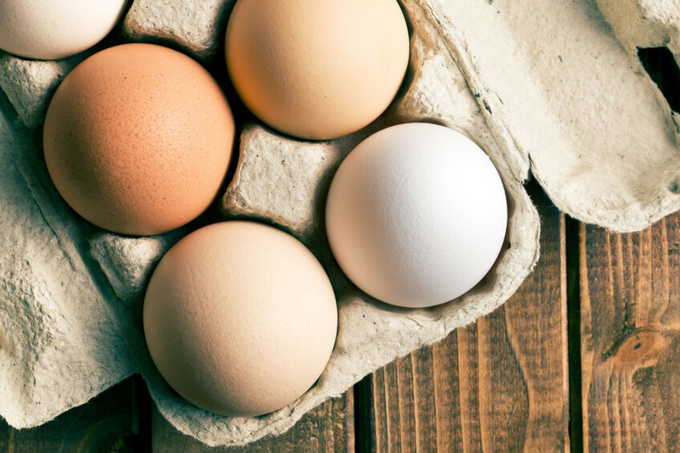November 27, 2025 | 03:14 GMT +7
November 27, 2025 | 03:14 GMT +7
Hotline: 0913.378.918
November 27, 2025 | 03:14 GMT +7
Hotline: 0913.378.918

The consumption of eggs in France grew by 5.2% in the first few months of this year. Photo: Canva
French egg producers are, over the next 6 years, going to invest €300 million in over 300 new sheds, or almost one a week, in order to keep production in line with the growing consumption of eggs.
By producing more in France, the organisation for the promotion of eggs, CNPO, wants to keep foreign competitors out of the market. “The self-sufficiency rate for eggs in our country currently stands at 99% – we want to keep it at least at that level,” CNPO says.
Last year, the French consumed the equivalent of 224 eggs per head, of which 45% at home, 41% as Ovo products (e.g., processed eggs in bakery products, pasta, etc.) and 12% in restaurants or other out-of-home places. The total consumption was 3% higher than in 2022, while production increased by 4% to 14.3 billion eggs. With that figure, France remained the largest producer of eggs in the EU, before Spain and Germany.
An anti-crisis foodstuff
French consumers consider eggs as the cheapest source of protein and a typical anti-crisis foodstuff, a number of surveys show. However, while the consumption grew further by an impressive 5.2% in the first few months of this year, production stagnates with a predicted growth of less than 1% in 2024, CNPO expects.
To maintain what the French now always call the food sovereignty for eggs, the industry launched a ‘Plan de filière’ or sector plan 2030. “Faced with this enthusiasm for our eggs, the sector should rapidly put its house in order after the recent episodes of avian influenza,” the organisation says.
‘Social aspects’
Apart from the investment of €300 million, there are also important social aspects, CNPO stresses. In the first place, it wants, in close cooperation with the poultry farmers, to make working in the poultry industry more attractive to young people and other newcomers. Moreover, in good French style, the sector expects a lot of help and support from the government, both on a national and regional level. Procedures and rules for new sheds or expanding existing poultry holdings should be made easier, with less openings for protests or objections by neighbours or others.
Administrative rules
Administrative rules should also be made less or in any case less burdensome, especially with regard to the new European directive on industrial emissions. Furthermore, poultry farms should also be better protected against attacks by animal activists or extremists, a growing problem in the French countryside. CNPO further asks the authorities to do more for the promotion of the label ‘Eggs of France’ to distinguish French eggs from foreign ones and so to encourage the consumer to buy eggs from national producers.
CNPO wants to put in its own efforts too. Firstly, the transition to alternative production systems, like free range or plein air, should go on at pace, the organisation stresses. Currently, some 80% of all eggs come from such systems, a percentage that hasn´t increased much over the last few years due to the economic crisis, the severe avian influenza epidemics and other problems.
Energy and consumer expectations
CNPO also wants to work on less energy consumption in combination with more renewable energy at poultry plants, more sustainable feed and feed production, greener transport and particularly a further improvement of animal welfare. Here, CNPO points out that France is only one of the 2 countries in the world that already made ovo-sexting compulsory in order to avoid the mass culling of male chicks.
With that all, both the organisation and the egg producers themselves realise that those are all matters that are increasingly high on the consumers’ list when choosing which eggs to buy and where those eggs should come from.
(PW)

(VAN) A new study reveals how the simultaneous effects of ocean acidification, salinity and loss of oxygen are making the world more fragile.

(VAN) Hopes are growing that the creation of the first 3D turkey gut model could be a turning point in the battle against the virulent blackhead disease.

(VAN) Tyson, America’s biggest meat supplier, plans to shutter one of its largest beef processing plants as the industry continues to struggle with low cattle supplies and political pressure from Washington.

(VAN) New FAO study shows how digital solutions are empowering farmers and fishers to prevent losses and build resilient agrifood systems.

(VAN) Brazil's COP30 presidency pushed through a compromise climate deal on Saturday that would boost finance for poor nations coping with global warming but that omitted any mention of the fossil fuels driving it.

(VAN) Poultry farmers in the UK have been warned that they could face one of the worst winters yet for bird flu.

(VAN) Prices of main-crop paddy have risen sharply, with jasmine rice hitting 16,100 baht per tonne — the highest level in years.